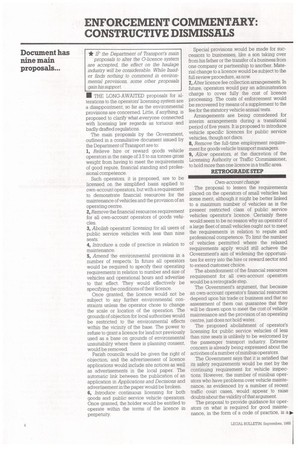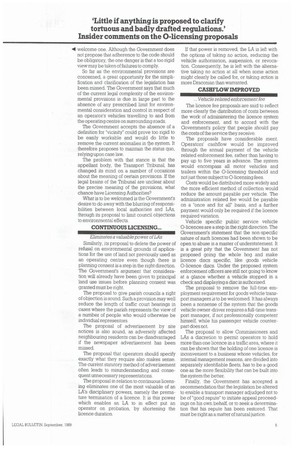ENFORCEMENT COMMENTARY: CONSTRUCTIVE DISMISSALS
Page 112

Page 113

If you've noticed an error in this article please click here to report it so we can fix it.
Document has nine main proposals...
• THE LONG-AWAITED proposals for alterations to the operators licensing system are a disappointment, so far as the environmental provisions are concerned. Little, if anything, is proposed to clarify what everyone connected with licensing law regards as tortuous and badly drafted regulations.
The main proposals by the Government, outlined in a consultative document issued by the Department of Transport are to: 1, Relieve hire or reward goods vehicle operators in the range of 3.5 to six tonnes gross weight from having to meet the requirements of good repute, financial standing and professional competence.
Such operators, it is proposed, are to be licensed on the simplified basis applied to own-account operators, but with a requirement to demonstrate financial resources for the maintenance of vehicles and the provision of an operating centre.
2, Remove the financial resources requirement for all own-account operators of goods vehicles.
3, Abolish operators' licensing for all users of public service vehicles with less than nine seats.
4, Introduce a code of practice in relation to maintenance.
5, Amend the environmental provisions in a number of respects. In future all operators would be required to specify their operating requirements in relation to number and size of vehicles and operational hours and advertise to that effect. They would effectively be specifying the conditions of their licence.
Once granted, the licence would not be subject to any further environmental constraints unless the operator chose to change the scale or location of the operation. The grounds of objection for local authorities would be restricted to the environmental effects within the vicinity of the base. The power to refuse to grant a licence for land not previously used as a base on grounds of environmental unsuitability where there is planning consent, would be removed.
Parish councils would be given the right of objection, and the advertisement of licence applications would include site notices as well as advertisements in the local paper. The automatic link between the publication of an application in Applications and Decisions and advertisement in the paper would be broken.
6, Introduce continuous licensing for both goods and public service vehicle operators. Once granted, the holder would be entitled to operate within the terms of the licence in perpetuity. Special provisions would be made for successors to businesses, like a son taking over from his father or the transfer of a business from one company or partnership to another. Material change to a licence would be subject to the full review procedure, as now.
7, Alter licence fee collection arrangements: In future, operators would pay an administration charge to cover fully the cost of licence processing. The costs of enforcement would be recovered by means of a supplement to the fee for the statutory vehicle annual tests.
Arrangements are being considered for interim arrangements during a transitional period of five years. It is proposed to introduce vehicle specific licences for public service vehicles, though not discs.
8, Remove the full-time employment requirement for goods vehicle transport managers.
9, Allow operators, at the discretion of the Licensing Authority or Traffic Commissioner, to hold more than one licence in a traffic area.
RETROGRADE STEP Own-account change The proposal to lessen the requirements placed on the operators of small vehicles has some merit, although it might be better linked to a maximum number of vehicles as is the present restricted class of public service vehicles operator's licence. Certainly there would seem to be no reason why an operator of a large fleet of small vehicles ought not to meet the requirements in relation to repute and professional competence. To limit the number of vehicles permitted where the relaxed requirements apply would still achieve the Government's aim of widening the opportunities for entry into the hire or reward sector and to extend customer choice.
The abandonment of the financial resources requirement for all own-account operators would be a retrograde step.
The Government's argument, that because an own-account operator's financial resources depend upon his trade or business and that no assessment of them can guarantee that they will be drawn upon to meet the cost of vehicle maintenance and the provision of an operating centre, just does not hold water.
The proposed abolishment of operator's licensing for public service vehicles of less than nine seats is unlikely to be welcomed by the passenger transport industry. Extreme concern is already being expressed about the activities of a number of minibus operators.
The Government says that it is satisfied that its safety requirements would be met by the continuing requirement for vehicle inspections. However, the number of minibus operators who have problems over vehicle maintenance, as .evidenced by a number of recent traffic court cases, would appear to raise doubts about the validity of that argument.
The proposal to provide guidance for operators on what is required for good maintenance, in the form of a code of practice, is a B. 4 welcome one. Although the Government does not propose that adherence to the code should be obligatory, the one danger is that a too rigid view may be taken of failures to comply.
So far as the environmental provisions are concerned, a great opportunity for the simpli fication and clarification of the legislation has been missed. The Government says that much of the current legal complexity of the environ mental provisions is due in large part to the absence of any prescribed limit for environmental consideration and control in respect of an operator's vehicles travelling to and from the operating centre on surrounding roads.
The Government accepts the absence of a definition for "vicinity could prove too rigid to be easily workable and would do little to remove the current anomalies in tie system. It therefore proposes to maintain the status quo, relying upon case law.
The problem with that stance is that the appellant body, the Transport Tribunal, has changed its mind on a number of occasions about the meaning of certain provisions, If the legal brains of the Tribunal are unclear about the precise meaning of the provisions, what chance have Licensing Authorities?
What is to be welcomed is the Government's desire to do away with the blurring of responsi bilities between local authorities and LAs, through its proposal to limit council objections to environmental effects.
CONTINUOUS LICENSING...
Eliminates a valuable power of LAs Similarly, its proposal to delete the power of refusal on environmental grounds of applications for the use of land not previously used as an operating centre even though there is planning consent is a step in the right direction. The Government's argument that consideration will already have been given to principal land use issues before planning consent was granted must be right.
The proposal to give parish councils a right of objection is sound. Such a provision may well reduce the length of traffic court hearings in cases where the parish represents the view of a • number of people who would otherwise be individual representors.
The proposal of advertisement by site notices is also sound, as adversely affected neighbouring residents can be disadvantaged if the newspaper advertisement has been trussed.
The proposal that operators should specify exactly what they require also makes sense. The current statutory method of advertisement often leads to misunderstanding and consequent unnecessary representations.
The proposal in relation to continuous licensing eliminates one of the most valuable of an LA's disciplinary powers, namely the premature termination of a licence. It is this power which enables an LA to in effect put an operator on probation, by shortening the licence duration. If that power is removed, the LA is left with the options of taking no action, reducing the vehicle authorisation, suspension, or revocation. Consequently, he is left with the alternative taking no action at all when some action might clearly be called for, or taking action is more Draconian than warranted.
CASHFLOW IMPROVED
.„ Vehicle related enforcement fee The licence fee propocalc are said to reflect more clearly the distribution of costs between the work of administering the licence system and enforcement, and to accord with the Government's policy that people should pay the costs of the service they receive.
The proposals have considerable merit. Operators' cashflow would be improved through the annual payment of the vehicle related enforcement fee, rather than having to pay up to five years in advance. The system would encompass all motor vehicles and trailers within the 0-licensing threshold and not just those subject to 0-licensing fees.
Costs would be distributed more widely and the more efficient method of collection would reduce the amount payable per vehicle. The administration related fee would be payable on a "once and for all" basis, and a further payment would only be required if the licence required variation, Vehicle specific public service vehicle 0-licences are a step in the right direction. The Government's statement that the non-specific nature of such licences had been shown to be open to abuse is a master of understatement, It is a great pity that the Government has not proposed going the whole hog and make licence discs specific, like goods vehicle 0-licence discs. Under the proposed system enforcement officers are still not going to know at a glance whether a vehicle stopped in a check and displaying a disc is authorised.
The proposal to remove the full-time employment requirement for goods vehicle transport managers is to be welcomed. It has always been a nonsense of the system that the goods vehicle owner-driver requires a full-time transport manager, if not professionally competent himself, white his passenger vehicle counterpart does not.
The proposal to allow Commissioners and LAs a discretion to permit operators to hold more than one licence in a traffic area, where it can be shown that the holding of one licence is inconvenient to a business whose vehicles, for internal management reasons, are divided into separately identifiable fleets, has to be a good one as the more flexibility that can be built into the system the better.
Finally, the Government has accepted a recommendation that the legislation be altered to enable a transport manager adjudged not to be of "good repute" to initiate appeal proceedings on his own behalf, or to seek a determination that his repute has been restored. That must be right as a matter of natural justice.




















































































































